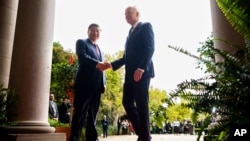U.S. President Joe Biden and Chinese President Xi Jinping made clear before they met outside of San Francisco on the sidelines of the Asia-Pacific Economic Cooperation (APEC) summit that they would not issue a joint statement.
But a comparison of their positions in written statements issued separately after the leaders met on Wednesday highlights continuing differences in four contentious areas.
Taiwan
China claims the self-governing island of Taiwan as its territory. The U.S. maintains a "robust" relationship with Taiwan and sells defense equipment to its military.
The Chinese statement specifically mentioned Biden's promise of last November when he met Xi on the sidelines of the G20 meeting in Bali, Indonesia, not to support Taiwan’s independence.
This position is not included in the White House statement.
The Chinese statement said that Xi reiterated the principle of the Taiwan issue during the meeting and pointed out that "the Taiwan question has always been the most important and sensitive issue in China-U.S. relations. China attaches great importance to the relevant positive statements made by the U.S. during the Bali meeting."
Xi asked Biden to not support Taiwan independence, "stop arming Taiwan, and support China's peaceful reunification."
Xi said that "China will eventually be reunified."
Biden did not directly respond to Xi's request to stop arming Taiwan in his statement. Instead, he reiterated his opposition to any party independently changing the status quo across the Taiwan Strait.
Biden emphasized that the U.S. one-China policy has not changed and has been consistent across decades and administrations.
Biden said in the statement, "The United States opposes any unilateral changes to the status quo from either side, that we expect cross-strait differences to be resolved by peaceful means, and that the world has an interest in peace and stability in the Taiwan Strait."
The U.S. one-China policy recognizes the Chinese government as the only Chinese government but does not endorse Beijing’s view of Taiwan as a breakaway province.
Biden also called on China to restrain its military activities around the Taiwan Strait.
Ukraine and Israel
After Russia invaded Ukraine on Feb. 24, 2022, and Hamas attacked Israel on Oct. 7, the U.S. repeatedly called on China to mediate. Ukraine and Israel have publicly sought China's support.
The U.S. statement said that the two leaders exchanged views on the two conflicts. Biden reiterated that the U.S., with global allies and partners, will continue to support Ukraine in resisting Russian aggression. On the Israel-Hamas conflict, Biden reiterated U.S. support for Israel's right to fight terrorism and emphasized the importance of all countries using their influence to prevent escalation and expansion of the conflict.
The Chinese statement did not mention Ukraine or Israel. Last year in Bali, Xi stated that China was highly concerned about the situation in Ukraine.
Trade and the economy
Xi expressed dissatisfaction with U.S. containment of China's chip development, while Biden was concerned about China's "unfair trade policies, non-market economic practices and punitive actions against U.S. firms." He said that the U.S. would not set excessive restrictions on trade and investment.
According to the Chinese statement, Xi said that the U.S. continues to impose restrictions on China regarding export controls, investment reviews and unilateral sanctions. He said that China drives development through innovation and that suppressing China's science and technology would curb China's high-quality development and deprive the Chinese people of their right to growth.
He called on the U.S. to face up to China's concerns, lift unilateral sanctions, and provide a non-discriminatory environment for Chinese companies.
The Chinese statement also quoted Biden as saying, "The U.S. and China are economically interdependent. The U.S. is happy to see China develop and prosper. It does not seek to suppress and contain China's development, nor does it seek to decouple from China."
Biden emphasized that the United States will continue to take necessary actions to prevent advanced U.S. technologies from being used to undermine U.S. national security, without unduly limiting trade and investment.
Human rights
Many dissidents living in the U.S., including those from Hong Kong, Tibet and the Uyghur community, gathered in San Francisco during Xi's first visit to the U.S. in seven years to protest the Chinese government's suppression of human rights.
According to the U.S. statement, Biden underscored the universality of human rights and the responsibility of all nations to respect their international human rights commitments. He raised concerns regarding PRC human rights abuses, including in Xinjiang, Tibet and Hong Kong.
He said that resolving the cases of some U.S. citizens who are wrongfully detained or subject to exit bans in China remains a priority for him.
China's statement did not mention these human rights issues.












